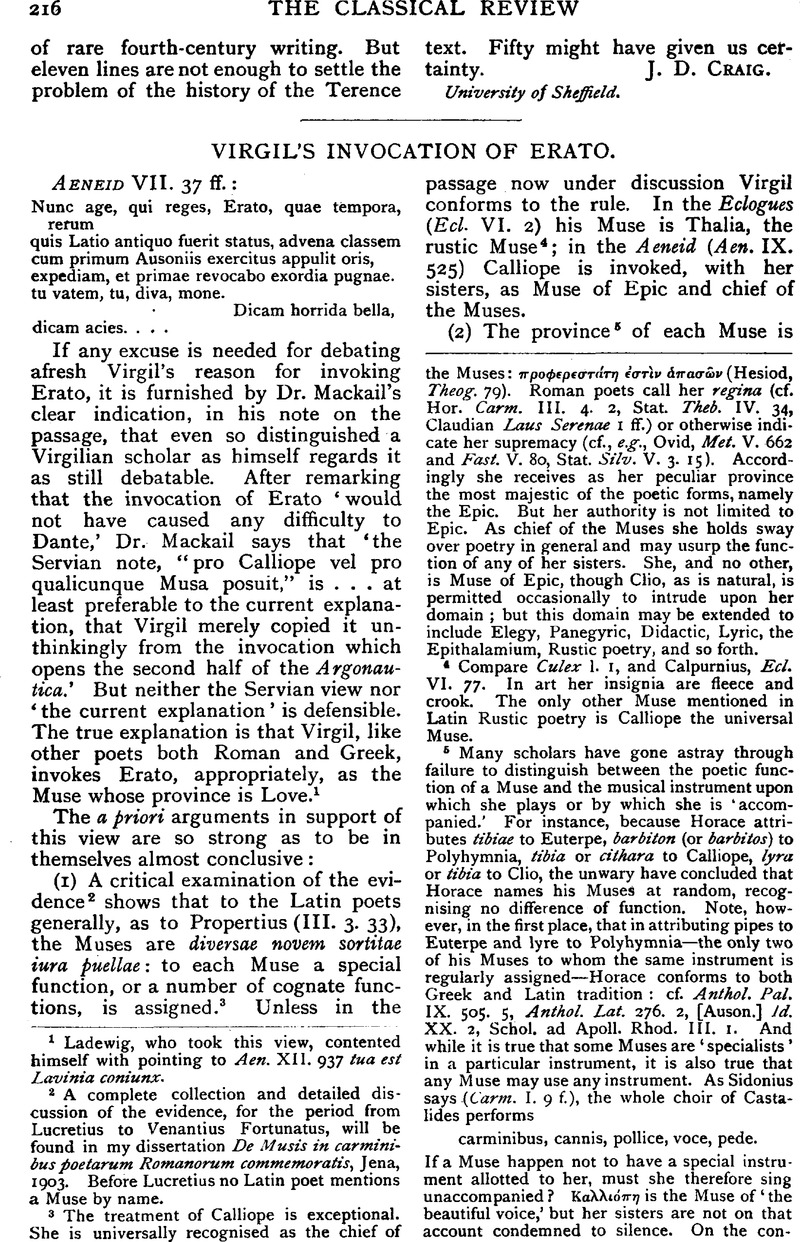Article contents
Virgil's Invocation of Erato
Published online by Cambridge University Press: 27 October 2009
Abstract

- Type
- Review Article
- Information
- Copyright
- Copyright © The Classical Association 1931
References
1 Ladewig, who took this view, contented himself with pointing to Aen. XII. 937 tua est Lavinia coniunx.
2 A complete collection and detailed discussion of the evidence, for the period from Lucretius to Venantius Fortunatus, will be found in my dissertation De Musis in carminibus poetarum Romanorum commemoratis, Jena, 1903. Before Lucretius no Latin poet mentions a Muse by name.
3 The treatment of Calliope is exceptional. She is universally recognised as the chief of the Muses: ![]() (Hesiod, Theog. 79). Roman poets call her regina (cf. Hor. Carm. III. 4. 2, Stat. Theb. IV. 34, Claudian Laus Serenae 1 ff.) or otherwise indicate her supremacy (cf., e.g., Ovid, Met. V. 662 and Fast. V. 80, Stat. Silv. V. 3. 15). Accordingly she receives as her peculiar province the most majestic of the poetic forms, namely the Epic. But her authority is not limited to Epic. As chief of the Muses she holds sway over poetry in general and may usurp the function of any of her sisters. She, and no other, is Muse of Epic, though Clio, as is natural, is permitted occasionally to intrude upon her domain; but this domain may be extended to include Elegy, Panegyric, Didactic, Lyric, the Epithalamium, Rustic poetry, and so forth.
(Hesiod, Theog. 79). Roman poets call her regina (cf. Hor. Carm. III. 4. 2, Stat. Theb. IV. 34, Claudian Laus Serenae 1 ff.) or otherwise indicate her supremacy (cf., e.g., Ovid, Met. V. 662 and Fast. V. 80, Stat. Silv. V. 3. 15). Accordingly she receives as her peculiar province the most majestic of the poetic forms, namely the Epic. But her authority is not limited to Epic. As chief of the Muses she holds sway over poetry in general and may usurp the function of any of her sisters. She, and no other, is Muse of Epic, though Clio, as is natural, is permitted occasionally to intrude upon her domain; but this domain may be extended to include Elegy, Panegyric, Didactic, Lyric, the Epithalamium, Rustic poetry, and so forth.
4 Compare Culex 1. 1, and Calpurnius, Ecl. VI. 77. In art her insignia are fleece and crook. The only other Muse mentioned in Latin Rustic poetry is Calliope the universal Muse.
5 Many scholars have gone astray through failure to distinguish between the poetic function of a Muse and the musical instrument upon which she plays or by which she is ‘accompanied.’ For instance, because Horace attributes tibiae to Euterpe, barbiton (or barbitos) to Polyhymnia, tibia or cithara to Calliope, lyra or tibia to Clio, the unwary have concluded that Horace names his Muses at random, recognising no difference of function. Note, however, in the first place, that in attributing pipes to Euterpe and lyre to Polyhymnia—the only two of his Muses to whom the same instrument is regularly assigned—Horace conforms to both Greek and Latin tradition: cf. Anthol. Pal. IX. 505. 5, Anthol. Lat. 276. 2, [Auson.] id. XX. 2, Schol. ad Apoll. Rhod. III. 1. And while it is true that some Muses are ‘specialists’ in a particular instrument, it is also true that any Muse may use any instrument. As Sidonius says (Carm. I. 9 f.), the whole choir of Castalides perform carminibus, cannis, pollice, voce, pede.
If a Muse happen not to have a special instrument allotted to her, must she therefore sing unaccompanied ? Kαλλι is the Muse of ‘the beautiful voice,’ but her sisters are not on that account condemned to silence. On the con trary, all nine Muses sing μειβμεναιπ καλ (Horn. Od. XXIV. 60 and il. I. 604).
The special instrument of Erato (as also of Polyhymnia) is the lyre (cf. [Auson.] Id. XX. 6, Anthol. Lat. 276. 6, Anthpl. Pal. IX. 505. 3); but her poetic function is Love.
1 It is the function of Mελπομνη to teach cantus (μολπáς), just as the function of Kλειώ (cf. Hor. Carm. I. 12. 2) is celebrare (κλεíειν). Here the emphasis is on lugubres: on so sad an occasion Melpomene is to ‘ teach mournful songs.’ Horace's habit of indicating the significance of his Greek proper names (cf. Lalagen … dulce loquentem, etc.) is too well known to need further exemplification.
2 Sometimes, of course, a Muse is named (though never invoked) where her special poetic function is not in point. Thus Clio Cliusque sorores (Ovid, A.A. I. 27) means simply Musae; in doctor argutae fidicen Thaliae Hor. Carm. IV. 6. 25) the name of any other. Muse might be substituted, with equal propriety, for that of Thalia; and similarly elsewhere.
- 2
- Cited by




